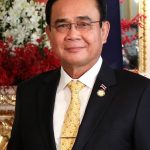Politics
Thailand Politics
This page explores Thailand’s political structure incorporating real-time RSS feed news and videos. By harnessing the power of RSS feeds, visitors can stay informed about the latest developments in Thailand’s politics as they happen. The dynamic nature of these feeds ensures that users receive up-to-the-minute updates on political events, policy changes, and significant milestones, enabling them to stay abreast of the ever-evolving political scene.

Prayut Chan-o-cha
Prime Minister of Thailand
Incumbent
Assumed office
22 May 2014
Acting: 22 May 2014 – 24 August 2014
Image credit
Until 22 May 2014, the politics of Thailand were conducted within the framework of a constitutional monarchy, whereby the prime minister is the head of government and a hereditary monarch is head of state. The judiciary is independent of the executive and the legislative branches. Following the coup d’état of 22 May 2014 revoking the 2007 constitution, a military organization called National Council for Peace and Order (NCPO) had taken over administration. The chief of NCPO abolished the national assembly and assumed the responsibilities of the legislative branch. Under the martial law enforced throughout the kingdom, military courts have been tasked to be responsible for some cases that are normally under the civilian courts. However, the court system, including the Constitutional Court, still remains in existence, even without the constitution. The NCPO was formally dissolved following the swearing-in of the new cabinet on 16 July 2019.
Thai kingdoms and the late Kingdom of Siam were under absolute rule of kings. After the “democratic revolution” in 1932, led by Westernized bureaucrats and a tradition-oriented military, the country officially became a constitutional monarchy with a prime minister as the government head. The first written constitution was issued. Politics became the arena of fighting factions between old and new elites, bureaucrats, and generals. Coups happened from time to time, often bringing the country under the rule of yet another junta. To date Thailand has had 20 charters and constitutions, reflecting a high degree of political instability. After successful coups, military regimes have abrogated existing constitutions and promulgated interim charters. Negotiations between politicians, bureaucrats, influence peddlers, Corporate Leaders and Army Officers have become a driving force in the restoration of temporary political stability.
Unless other sources are listed, original content is provided by ChatGPT. ChatGPT may produce inaccurate information about people, places, or facts. #Thailand #ThailandPolitics #ThailandNews #ThailandNewsToday #ThailandRSSFeed #BlahFace



